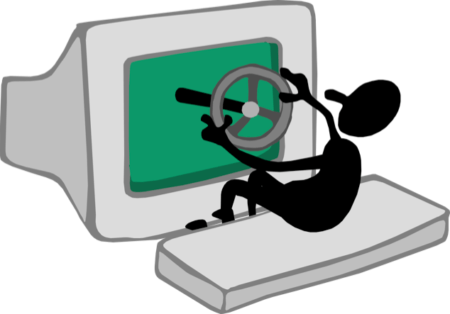The opposite of being a humane human. Road Rage. Have you been irritated by someone else’s driving? Of course, we all have.
Today I realized however that I am likely guilty of doing the precise thing that others have done to piss me off. However, when I did it, there was justification—of course. When they did the same thing, however, they were wrong, dumb, stupid, and worthy of decapitation. So what’s the difference?
On Being a Humane Human
Have you ever made a right turn in an automobile very slowly, because your grandma was in the back seat, or you didn’t want the pie to spill, or the house number you were seeking was right around the corner? Imagine so. But when someone makes the turn incredibly slowly in front of you, they are being rude and inconsiderate, correct? So what’s the difference?
The difference evidences itself when you seek to understand WHY. Chances are, the person who upset you had good reason in their own mind and was not attempting to be intentionally inconsiderate. They were not malicious at all. They simply had their own reasons.
We should always stay mindful of the phrase in St Francis’ Peace Prayer—Seek to understand, rather than being understood. The Dalai Lama also has a nice way of expressing similar sentiment when he states (paraphrased)—“When you speak, you are saying something you already know. When you listen, you may learn something new.”
Facilitators Need to Challenge WHY
As facilitators, we cannot afford to let down our guard. Keep the ego in the hallway. Challenge meeting and workshop participants to justify their positions by explaining WHY they are making a particular claim. Chances are, we will discover something new. By active listening through the reflection and confirmation of their rationale, we can begin to build consensus.
Would it bother you if I turned slowly around a corner if you already knew that I had an infirmed occupant or something that might spill? I imagine not, as you would likely have some compassion, not because you liked WHAT I was doing, but because you understood WHY I was doing it.
To build consensus, make sure everyone understands WHY claims are being made. They likely hear what the other person said (or did), but since it upsets them, they fail to understand nor strive to understand WHY. That’s your job as a facilitator. Build consensus around WHY since most WHAT everyone believes is not simply black or white, rather it is conditional. It’s your job to get the group to understand under what conditions someone’s erratic thoughts or behavior may in fact echo the same thing you would do if you were in their shoes.
______
Don’t ruin your career by hosting bad meetings. Sign up for a workshop or send this to someone who should. MGRUSH workshops focus on meeting design and practice. Each person practices tools, methods, and activities every day during the week. Therefore, while some call this immersion, we call it the road to building high-value facilitation skills.
Our workshops also provide a superb way to earn up to 40 SEUs from the Scrum Alliance, 40 CDUs from IIBA, 40 Continuous Learning Points (CLPs) based on Federal Acquisition Certification Continuous Professional Learning Requirements using Training and Education activities, 40 Professional Development Units (PDUs) from SAVE International, as well as 4.0 CEUs for other professions. (See workshop and Reference Manual descriptions for details.)
Want a free 10-minute break timer? Sign up for our once-monthly newsletter HERE and receive a timer along with four other of our favorite facilitation tools, free.

Terrence Metz, president of MG RUSH Facilitation Training, was just 22-years-old and working as a Sales Engineer at Honeywell when he recognized a widespread problem—most meetings were ineffective and poorly led, wasting both time and company resources. However, he also observed meetings that worked. What set them apart? A well-prepared leader who structured the session to ensure participants contributed meaningfully and achieved clear outcomes.
Throughout his career, Metz, who earned an MBA from Kellogg (Northwestern University) experienced and also trained in various facilitation techniques. In 2004, he purchased MG RUSH where he shifted his focus toward improving established meeting designs and building a curriculum that would teach others how to lead, facilitate, and structure meetings that drive results. His expertise in training world-class facilitators led to the 2020 publication of Meetings That Get Results: A Guide to Building Better Meetings, a comprehensive resource on effectively building consensus.
Grounded in the principle that “nobody is smarter than everybody,” the book details the why, what, and how of building consensus when making decisions, planning, and solving problems. Along with a Participant’s Guide and supplemental workshops, it supports learning from foundational awareness to professional certification.
Metz’s first book, Change or Die: A Business Process Improvement Manual, tackled the challenges of process optimization. His upcoming book, Catalyst: Facilitating Innovation, focuses on meetings and workshops that don’t simply end when time runs out but conclude with actionable next steps and clear assignments—ensuring progress beyond discussions and ideas.





Unfortunately, kind actions are more important, in fact, the only important thing; not simply kind words. Fortunately, thoughts usually precede words that precede actions, increasing the likelihood of kind actions.
Hope your move went smooth and pray for fewer fires.
Terrence – Thanks for the gentle reminder, as so much of what we do today is to keep things moving forward at a fast pace it is important to slow down and seek to understand before plowing ahead.
You’re highly conscious Cheryl, proven to be very competent, and a complete class act. Have a great new year.
Thank you Terrence for your kind words. I hope you have a happy New Year!